Suzanne Roman still wakes up during the night sometimes, remembering the time when rats chewed a hole through her tent and her little Jack Russell terrier Rascal went crazy barking at them. She was living in a friend’s backyard at the time; a long electrical cord ran from inside the house, allowing for electricity inside her outdoor home.
She has stories of sleeping in her car, too, stories about how it feels knowing that you may not have groceries or medicine or clean clothes to wear the next day, or the next week. “Through the grace of God I’ve gotten through that mentality of homelessness,” she said not long ago. It’s a mentality of hopelessness, she said, feeling like you’ll never climb out of the situation. “I do still wake up with nightmares sometimes and think I’m still in the tent.”
These days Roman, who recently celebrated her sixty-fifth birthday, is grateful for a good landlord in Vineyard Haven and her own place to fall asleep at night in an apartment she moved into a year ago. She is working part time at Stop & Shop and has a few gardening jobs. She handed me a large, colorful laminated business card that offered a variety of services, including personal gardening and cemetery plot maintenance. It had an illustration of a couple of chickens with daisies in the background. “I’m an artist, too,” she said.
The work helps pay the bills, along with some food stamps, though whenever she gets an increase in any form of public assistance, the amount she receives through another program gets decreased. She has MassHealth for her various health problems, but, she said, living out in the elements took its toll.She can’t always afford the vitamins that might help combat a chronic immune illness, and she needs hip surgery, which means time out of work so she puts it off.
A fit woman, she wears her dark hair down and doesn’t dress like one might expect a once-homeless woman to dress. Her hands are worn and gnarled with arthritis, but her clothes are clean and free of wrinkles. Her shoes are of good quality and she clearly mastered how to apply makeup somewhere along her journey. She looks good. But it upsets her when people judge her by her neat appearance. She can tell that people expect her to look “homeless” when she asks for assistance.
“I’ve had the same clothes for years,” she said. “Were they good clothes when I bought them? Yes. Did I buy them yesterday? No.”
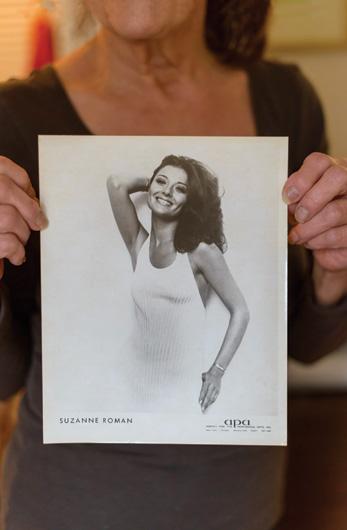
She is eager to talk about homelessness on Martha’s Vineyard, however, because she wants people to know what it’s like to sleep in their car night after night. What it’s like to come to rely on the kindness of strangers to be able to stay on the Vineyard. And that her situation is still precarious at best.
Another setback, another loss, and she knows she could be right back in her car.
Everybody on the Island, it seems, knows Junior Mendes. He walks around Vineyard Haven’s Main Street with his Mocha Mott’s coffee mug in hand nearly every day of the week. He’s at the Steamship Authority every day, too, greeting arrivals to the Vineyard with the cards he has printed at the Tisbury Printer. They include his signature phrases: “Too blessed to be stressed.” “Why hate when we can motivate.” “Let the hating stop and seek love from above.”
Most people smile back when he says hello, and they take the cards he offers. If they have a few minutes, he explains the story of the photo on some of the cards. He tells them about Daddy’s Caddy, his gold Cadillac adorned with knick-knacks and tchotchkes, and how he got President Clinton to sign it when the First Family visited the Vineyard in 1993.
“I’m all over the Internet,” he said over coffee at Waterside Market. “I had two Cadillacs and I decorated both. I even had a fire-breathing dragon on one.”
He was talking about the good old days, back when he first came to the Island around forty years ago and made money putting up drywall. He married early and had three boys before the marriage broke up after ten years. Photos on his cell phone today reveal grown-up sons with children of their own. He shook his head. “I don’t see them much,” he said.
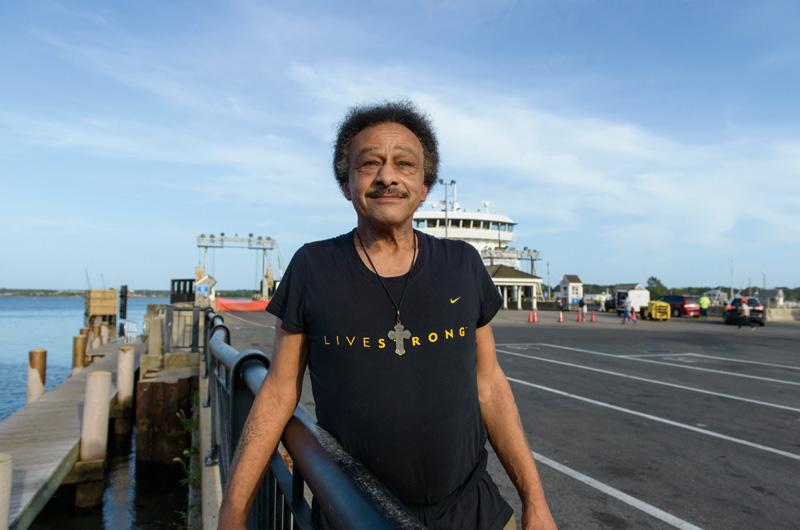
Also on his cell phone is a short video of his old campsite in the woods in Vineyard Haven, and his tent from last year. “It was real peaceful there. I’d rather listen to the birds than to cars any day,” he said. “Oh, it ain’t too bad,” he said when asked about the colder nights. “The cops don’t bother me. In fact, they usually ask me if I need a blanket.”
Now sixty-two, Mendes has been homeless off and on for years. His family life fell apart when he began drinking decades ago. “And we were too young,” he said, shaking his head again.
He’s been sober off and on, too, including a stretch that lasted thirteen years and ended with a multi-year bender in the Caribbean. He’s currently been clean for five years and these days he won’t even go to Oak Bluffs: “I don’t go across the bridge anymore. Too many bad memories, too much drinking. I’d rather stay in Vineyard Haven.”
On the nearby street, cars drove slowly by and nearly all of the drivers waved to Mendes, who responded with his ever-ready smile. He shook hands with other people who came by to grab something to eat, and when they asked him how he’s doing, he told them all he’s just fine.
What he didn’t tell them, however, is that he needed to find a new place to sleep soon because the motel he’d been staying at was set to raise its rates to summer prices. Friends had paid for him to stay there after recuperating from first a stroke and then surgery for his carotid artery, but with the arrival of peak prices they couldn’t afford to continue.
“I’ll sleep outside,” he said. “Or maybe when I get paid I’ll go over to Walmart and get me another tent.”
As it is everywhere else, homelessness on the Vineyard is hard to quantify. It’s related to, but not the same as, the perennial shortage of affordable housing on the Island. It’s often related to, but not the same as, issues of addiction, of health care costs, of domestic unhappiness.
The numbers reported through the county’s annual homeless count were not much more than a dozen this year, but the people who interact regularly with the homeless on the Island – the clergy, the police, and others – universally agree that it is a much bigger problem. Those who have been or are homeless, for the most part, are not surprised at the under-reporting, usually giving some variation on the same explanation: They don’t want you to know where they are.
There may be some progress in the offing. A UMass Medical School program called the Rural Scholars Committee recently studied the unique aspects of the issue on the Island and recommended the creation of a homeless coalition. More concretely, with the support of state Representative Tim Madden and Senator Dan Wolf, the Massachusetts legislature recently overrode a veto by Governor Charlie Baker and passed legislation that included an allocation of $45,000 for a part-time caseworker to serve the homeless population on Martha’s Vineyard. According to Dukes County manager Martina Thornton, the Housing Assistance Corporation, based in Hyannis, will oversee the position.
“That person will work with clients, helping with self-sufficiency, outreach, referrals,” she said. But as of press time, the funds were not yet available and the job was unfilled. “We’d like to have a person in place before winter starts.”
For the moment, therefore, the county has few resources to alleviate the problem. “The county budgets $1,000 for motel vouchers for people on the street in the winter. We can put them up for a night or two, and then get them to the shelter in Hyannis,” Thornton said.
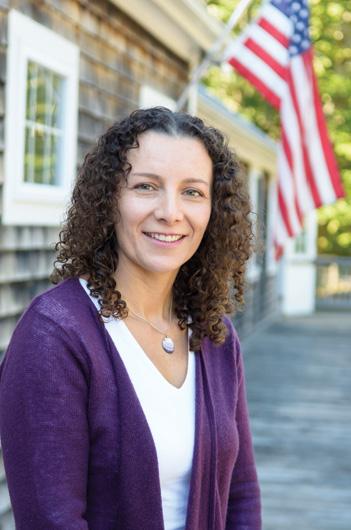
There is also an effort by the Island Clergy Association, along with members of many of the faith communities, to help those facing cold nights without shelter or food. They meet regularly to discuss the situation and are aiming to establish a program that would run for twelve weeks in the winter, modeled after “Hospitality Homes” programs on Cape Cod and southeastern Massachusetts.
Reverend Vincent “Chip” Seadale, rector of Saint Andrew’s Episcopal Church in Edgartown, explained that Island churches would work together, each hosting the homeless on specific nights, providing seven nights of shelter during the winter months. So far Saint Andrew’s and the Federated Church in Edgartown have agreed to open their doors to the Island’s homeless this coming winter, and the group is hopeful parishes will follow suit. “There seems to be a lot of interest from all the faith communities to staff and provide food for the program, but we need another site to host it,” Seadale said.
And the clergy aren’t alone. Seadale said the Island Housing Trust, the regional housing authority, the county, and the Boards of Health, are all trying to “get better focus on what this [homelessness] means for housing overall.”
“The towns have to do something,” he said. “We can’t keep turning a blind eye to how the Island works, its shuffle and the people who get lost in the cracks during that shuffle. If we’re going to be responsible citizens we need to address it. It’s not a normal situation, this population shuffle and change.”
Seadale pointed out that it’s not just adults who find themselves without shelter. A school official reported to the clergy’s Homeless Task Force that typically there were fifteen to twenty un-housed teenagers attending the high school during the school year.
“The most current number was eighteen,” Seadale said. “We don’t care what their issues are. We just know they need a place where they can be safe. You know, they say society is judged by how it treats the least of its members. We have to decide how we’re going to be as a community on this Island.”
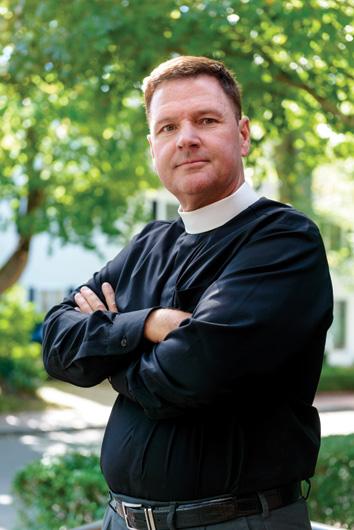
In the absence of a shelter on the Island, one place some of the homeless gather is at the community suppers hosted by the Vineyard clergy, where anyone can get a hot meal every night of the week in the winter months. There, along with members of the community who come for the company, or come because they are having trouble making ends meet but are not homeless, are Islanders who wound up sleeping in their vehicles when their seasonal employment ran out. And others who split from their girlfriends and were left with no place to go. One man said a store owner let him sleep in her store at night. Before that, he jimmied open the door of a summer home and slept there. “I didn’t take my bike anywhere near that place,” he said.
In other words, everyone who winds up homeless on the Island gets to that point by their own unique path. No one, or almost no one, sets out to find themselves without a roof or a bed. For Suzanne Roman, life on the Vineyard started out storybook enough. A former model and actress, she came to the Island from New York City in the mid-nineties to visit a friend and met Peter Allendorf, a retired schoolteacher. After writing letters back and forth, he invited her back to stay. They built a life together at his Katama home, working as caretakers and landscapers during his retirement years. But when he died suddenly in May of 2012, his family allowed her to stay in the house through that summer and into the fall. After that, she was on her own.
She’s a gracious host, offering a visitor a cold drink or something to eat. Her dog Rascal seemed nervous as she began to talk about the despair she felt when she was sleeping in a tent, as if he too remembered when they were homeless together. She counted the months on her fingers, trying to keep straight all the living arrangements she’s had. Before she began sleeping in her car and then a tent, she found a winter rental through a friend. But the money ran out and she had to leave.
She spoke about a shop where she could get a free sandwich when she was hungry, and of her sense of shame about the time she helped herself to the salad bar at a local market and walked out without paying. “I did go back and give a woman there five dollars and apologized later,” she said, but it’s obvious the feeling of guilt still lingers. Though she struggled with addiction during her career as a model in New York, she’s been sober for twenty-five years and attributes her survival to her faith. “Whatever His will is, I will accept it,” she said.
“Oh, I have family in California,” she said without being asked. “I reached out to them but they didn’t help.” Instead, it was Island friends, old and new, who came to her aid time after time. For every difficult part of her journey, it seems, she has an equally uplifting anecdote to tell. She ran into a friend at the grocery store one time when she was trying to decide between food for Rascal or something for herself, and the woman reached into her pocket and gave her $100.
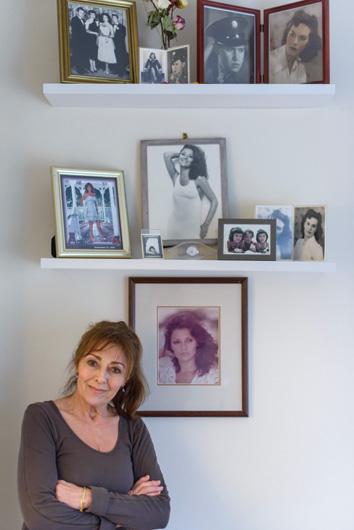
“My friend Barry let me stay in the tent in her yard and we just made the best of it. I put one foot in front of the other. My friend Carolee helped me get a gardening job and helped me find this place. There are people I’ve met along the way and that’s how I knew who my friends were; the ones I reached out to weren’t there for me, but the ones I least expected were the ones who were.”
It’s why she loves her life here, she said. She can’t go back to California or New York City, where she was living before she came to the Vineyard, she said. Her Island friends have become her family. The Island is her home. But she wants people to understand that even though the Vineyard is known for its affluence, there are people here who find themselves homeless due to circumstances beyond their control.
“It could be you, it could be anybody,” she said. “I never thought I would be homeless, but I was.”
Just as everyone has their own route to homelessness, everyone who winds up without a roof or bed figures out their own particular strategy for survival. For Junior Mendes the strategy includes a post office box at the Vineyard Haven post office. In warm weather, he cleans up at Owen Park.
“We used to get mayonnaise packets and white bread at Cumby’s and have our supper down there,” he said of the early days, when he and a friend used to sleep in their cars off of Chicken Alley. Not that his diet has improved all that much in the intervening decades. “I eat bad, I know it. I microwave dinners at Cumby’s and sometimes I don’t eat till about nine o’clock at night,” he said.
He was back from a hospital off-Island, and his attitude was good. “I was grateful that I came out of a stroke,” he said, and added that he feels blessed. Health issues come with age for the well-to-do and the less fortunate alike, but when asked how someone who is homeless, who sleeps outside, could say such a thing, he said, “Money won’t get you into heaven. And you can go to all the AA meetings you want, but if you don’t love yourself, you aren’t going to make it.”
Every so often he took time to greet the other people at Waterside Market or those who were walking down the street. He gave a card to some young women having coffee at the next table, after which he leaned into our table and said, “I like meeting people,” as if it were a secret.
One of the young women looked at the car on his card and said, “I signed this car when I was nine years old. I actually rode in this car up Circuit Avenue. That windshield wiper trick was awesome.”
Mendes beamed, and said, “You see?” For now he’s still homeless but he’s sure things will change for him someday.
“If I ever make it big, I’m going to open up the biggest, best homeless shelter on Martha’s Vineyard, a place where we can teach them some skills,” he said.
“I’d rather be homeless than heartless any day.”

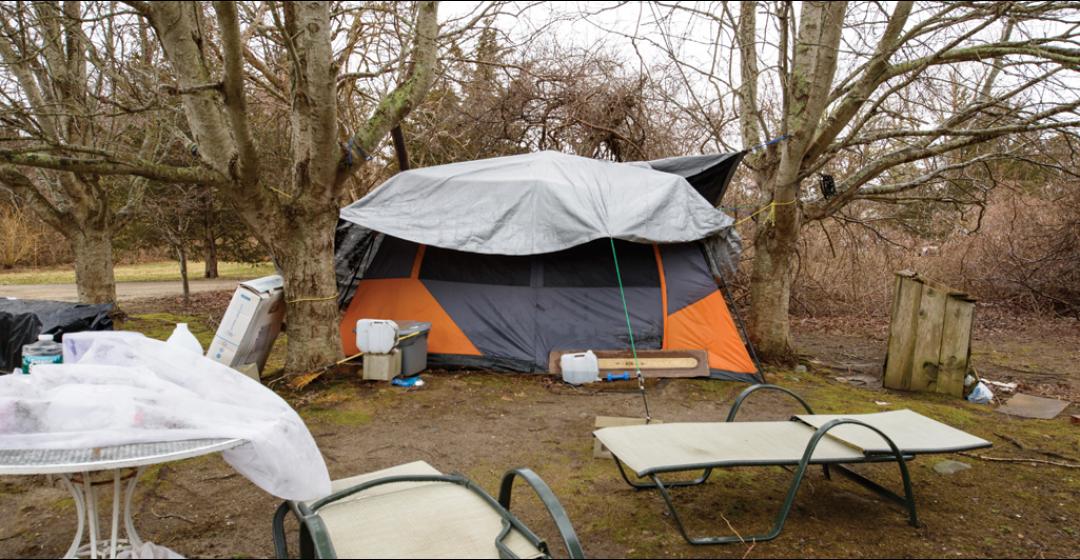


 1 comment
1 comment
Comments (1)